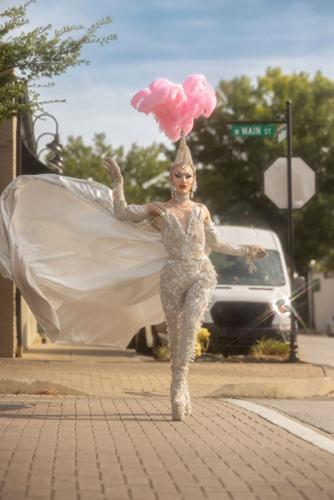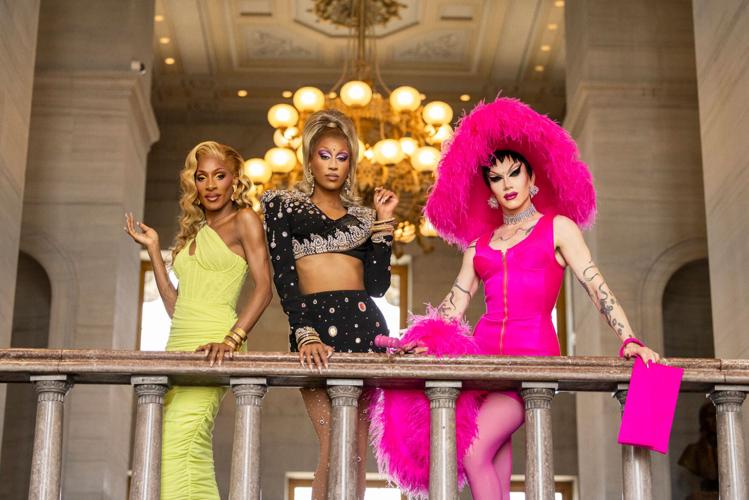
From left: Jaida Essence Hall, Priyanka and Sasha Velour
Sasha Velour changed the culture in the season nine finale of RuPaul’s Drag Race. That was when she lifted off her wig during a lip sync competition against Shea Couleé to reveal a cascade of rose petals. It happened during the crescendo of Whitney’s Houston’s “So Emotional,” and it set a new bar for drag, lip sync competitions and performance art in general. Now she’s changing the culture again by coming to one of the states at the heart of anti-LGBTQ and anti-drag legislation: Tennessee.
Velour, along with fellow drag queens Priyanka and Jaida Essence Hall, filmed the first three episodes of the fourth season of We’re Here in and around Nashville and Murfreesboro. The unscripted docuseries has gotten awards from GLAAD, as well as a Peabody and an Emmy, and it premieres Friday on HBO.
The Scene caught up with Velour on Zoom ahead of the season’s release to discuss the decision to film in Tennessee, the heroism of the Tennessee queer community and the hope she has for the future.
“The entire queer community, all of drag, was talking about Tennessee last year,” Velour says. “It frightened us from states away. It frightened a lot of people in the world. Tennessee was on the mind for sure.”
In October 2022, Murfreesboro’s city manager pledged to deny Tennessee Equality Project’s special-event permits for the city’s Pride celebration, which led to a lawsuit one year later. The City of Murfreesboro ultimately settled the lawsuit, agreeing to pay TEP half a million dollars and repeal a city ordinance aimed at banning drag performances on public property. This is all in addition to a slate of anti-LGBTQ bills filed by Tennessee’s Republican supermajority during last year’s legislative session.
When you watch this season of We’re Here, you may see some familiar faces from Play and the Nashville drag scene.
“A lot of the Nashville queens we spoke to came from small towns like Murfreesboro,” Velour says. “Seeing a place that they want to feel hometown pride in become a place that is spewing hatred and misinformation, I think was pretty destabilizing.”

Sasha Velour
Velour doesn’t believe that drag is inherently anything, but that it’s only what we make it. If there's an all-ages drag show, that means all the drag you see there is family-friendly, and appropriate for people of all ages and backgrounds.
“Of course, there are adults-only drag shows, but that's not really the kind of drag I do — and I want to be sexier, but I just keep doing family-friendly drag,” Velour says with a laugh. “I think it's important for young people to see queer adults having fun, and taking pride in our differences. It makes sense to young people, because young people understand play, joy and life without shame or self-consciousness.”
In We’re Here, Velour says that the drag heroes Murfreesboro needs aren’t coming to town; they’re already here. She didn’t see her role as teaching her drag daughter Veronica Paige anything about how to be a drag queen. A longtime drag artist in Murfreesboro, Paige already had that.
“I was reminding her what she's got, and seeing from an outside perspective how special she really is,” Velour says. “I know how to set the stage nicely and turn the lights on just right, so that they hit you at that moment so that your sparkle really sparkles. I saw that as my task.”
Laughing, Velour says that she is still in touch with all of her Murfreesboro friends. Paige will be a special guest at Nightgowns, Velour’s lauded drag revue in New York City.
After they wrapped filming, Velour came back to Tennessee in October to attend BoroPride. “It was amazing,” Velour says. “To see that community again that I had fallen in love with.”
The BoroPride organization ultimately decided to play it safe and not have drag performances. Drag artists were allowed to come to the venue in drag and speak on the microphone, but not perform. Velour says that, as Prides go, it was a little disappointing.
“I don't really offer free performances very often, but I was offering,” Velour says. “And they said no. It's like, what makes us different from any band up on the stage or any artists selling their work there? So that just showed the misinformation got in deep.”
Drag made space for Velour. When she started out, she was at a rough point in her life — she wanted to silence herself and disappear. She was dealing with body dysmorphia connected to her gender, as well as an eating disorder. She didn’t want to live. Then she found drag.
“Getting to step out of my body and my face and all these like things I thought I was, and imagine what I could be, created space in the most profound way,” Velour says. “Being able to sit in my body and feel excited about it. Excited about putting on clothes and going out and having people see me. The confidence of thinking that I can take up space like this. I learned that from drag queens, so I always want to carry that forward.”
Velour is grateful for her time here. She didn’t imagine feeling at home when she arrived, but now she misses Murfreesboro and the people, and she credits the queer community.
“My experience was so positive that I was walking away with hope,” she says. “My takeaway was of the heroism of these Tennesseans that I met, who are — who should be — proud to be from Tennessee and proud to be queer. That's what we're looking for.”
The city has agreed to pay $500,000 to event organizers Tennessee Equality Project
In response to the onslaught of anti-LGBTQ legislation throughout Tennessee, people are getting involved
Last week, Gov. Bill Lee signed a pair of bills targeting drag shows and trans health care. Here are ways to help the queer community.
Pride events in Franklin and Nashville will move forward, while Murfreesboro and Knoxville events are on shakier ground










